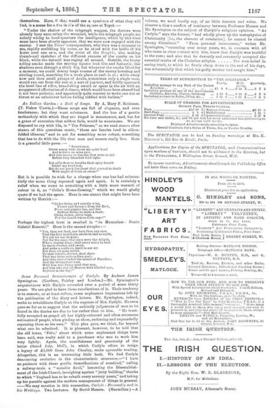An. Italian Garden : a Book of Songs. By A.
Mary F. Robinson.
(T. Fisher Hnwin.)—These songs are full of elegance, and even tenderness; but they want substance. And the hue of a gentle melancholy with which they are tinged is monotonous, and, but for a grace of execution that seldom fails, would be wearisome. We are disposed to cry with Ida, in "The Princess," as we read stanza after stanza of this querulous music, "these are fancies bred in silken.
folded idleness," and to ask for something more robust, something that has to do with the life that men and women really live. Here is a graceful little poem :—
" STREWINGS.
Strow poppy buds about my quiet head And pansies on mine eyes.
And rose-leaves on the lips that were so red Before they blanched with sighs.
Let gillyflowers breathe their spicy breath Under my tired feet, But do not mock the heart that starved to death With aught of fresh or sweet:"
Bat it is possible to wish for a change when one has had substan- tially the • same thing repeated again and again. It is certainly a relief when we come to something with a little more warmth of -colour in it, as " Celia's Home-Coming," which we would gladly quote if we had the space. Here is one stanza that might have been written by Herrick :—
"Cyder bring an-i cowslip wine, Fruits and flavours from the East, Pears and pippins too, and fine Saffron loaves to make a feast : China dishes, silver cups.
For the board where Celia sups !"
Perhaps the highest level is reached in "In Memoriam : Dante Gabriel Rossetti." Here is the second strophe :—
"Yea, thou art dead, nor bast thou any care That the first hawthorn swells in bud to-night,
Nor yet for our despair Nor for the song; that once were thy delight, Whose singing wings shall never cease to beat In DIMAS strange and sweet, And make a south; rn April in our air.
Bat then art gone before To that remote, eternal, final shore That was thine uuforgotten goal ; And thou bast climbed the mount of Paradise; And thy triumphant soul, With him who living went that way.
And him who saw all Heaven with blinded eyes, Rejoices in the day I"


































 Previous page
Previous page